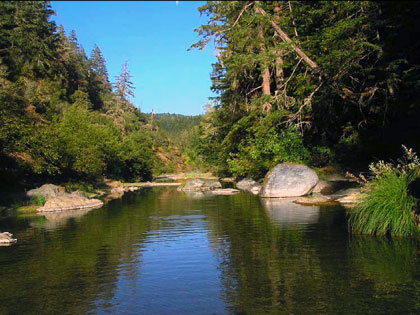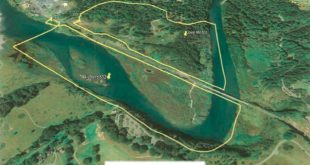
The Legislature has given the California State Lands Commission authority over California’s sovereign lands – lands under navigable waters. These are lands to which California received title upon its admission to the Union and that are held by virtue of its sovereignty. These lands are also known as public trust lands. The Commission administers public trust lands pursuant to statute and the Public Trust Doctrine – the common law principles that govern use of these lands.
Public Trust Doctrine
The Public Trust Doctrine is set forth in common law. Several of its guiding principles are that:
- Lands under the ocean and under navigable streams are owned by the public and held in trust for the people by government. These are referred to as public trust lands, and include filled lands formerly under water. Public trust lands cannot be bought and sold like other state-owned lands. Only in rare cases may the public trust be terminated, and only where consistent with the purposes and needs of the trust.
- Uses of trust lands, whether granted to a local agency or administered by the State directly, are generally limited to those that are water dependent or related, and include commerce, fisheries, and navigation, environmental preservation and recreation. Public trust uses include, among others, ports, marinas, docks and wharves, buoys, hunting, commercial and sport fishing, bathing, swimming, and boating. Public trust lands may also be kept in their natural state for habitat, wildlife refuges, scientific study, or open space. Ancillary or incidental uses, that is, uses that directly promote trust uses, are directly supportive and necessary for trust uses, or that accommodate the public’s enjoyment of trust lands, are also permitted. Examples include facilities to serve visitors, such as hotels and restaurants, shops, parking lots, and restrooms. Other examples are commercial facilities that must be located on or directly adjacent to the water, such as warehouses, container cargo storage, and facilities for the development and production of oil and gas. Uses that are generally not permitted on public trust lands are those that are not trust use related, do not serve a public purpose, and can be located on non-waterfront property, such as residential and nonmaritime related commercial and office uses. While trust lands cannot generally be alienated from public ownership, uses of trust lands can be carried out by public or private entities by lease from this Commission or a local agency grantee. In some cases, such as some industrial leases, the public may be excluded from public trust lands in order to accomplish a proper trust use.
- Because public trust lands are held in trust for all citizens of California, they must be used to serve statewide, as opposed to purely local, public purposes.
Commission Authority
The Legislature has granted general authority to the Commission to manage trust lands. Unless otherwise expressly stated in the State Constitution or statutes, the public trust doctrine mandates the criteria for Commission management of trust lands. In carrying out its management responsibilities, the Commission commonly leases trust lands to private and public entities for uses consistent with the doctrine. Subject to the criteria in statutes and case law, the Commission may also exchange public trust lands for non-trust lands, lift the trust from public trust lands, enter into boundary line agreements, and otherwise generally manage trust lands. While most of the authority over public trust lands possessed by the Legislature is vested in the Commission, the Legislature, as the people’s elected representatives, has not delegated the authority to modify uses permitted on public trust lands by the Public Trust Doctrine. There are times when the Legislature, exercising its retained powers, enacts laws dealing with public trust lands and uses for specified properties. This may include, in limited circumstances, allowing some non-trust uses when not in conflict with trust needs, in order to serve broader public trust purposes.
Implementation by the Commission of the Public Trust Doctrine
The Commission implements the Public Trust Doctrine through careful consideration of its principles and the exercise of discretion within the specific context of proposed uses. Factors such as location, existing and planned surrounding facilities, and public needs may militate in favor of a particular use in one area and against the same use in another. The Commission applies the doctrine’s tenets to proposed projects with consideration given to the context of the project and the needs of a healthy California society, to meet the needs of the public, business and the environment. The Commission may also choose among competing valid trust uses. The Commission must also comply with the requirements of other applicable law, such as the California Environmental Quality Act. In administering its trust responsibilities, the Commission exercises its discretionary authority in a reasoned manner, accommodating the changing needs of the public while preserving the public’s right to use public trust lands for the purposes to which they are uniquely suited.
Relationship of the Commission to Granted Lands
The Legislature has granted certain public trust lands to local governments for management. A grantee must manage trust lands consistent with its own granting statutes and the Public Trust Doctrine. The Legislature has retained for the state, by delegating to the Commission, the power to approve land exchanges, boundary line agreements, etc.
The State Lands Commission exercises oversight over all granted lands. Generally, this means the Commission carries out this responsibility by working cooperatively with grantees to assure that requirements of the legislative grants and the Public Trust Doctrine are carried out and to achieve trust uses. The Commission monitors and audits the activities of the grantees to insure that they are complying with the terms of their statutory grants and with the public trust. With a few exceptions, grantees are not required to secure approval from the Commission before embarking on development projects on their trust lands nor before expending revenues generated from activities on these lands. However, where an abuse of the Public Trust Doctrine or violation of a legislative grant occurs, the Commission can advise the grantee of the abuse or violation; if necessary, report to the Legislature, which may revoke or modify the grant; or file a lawsuit against the grantee to halt the project or expenditure.
Source: Public Trust Policy for the California State Lands Commission.
 Friends of Gualala River Protecting the Gualala River watershed and the species living within it
Friends of Gualala River Protecting the Gualala River watershed and the species living within it


